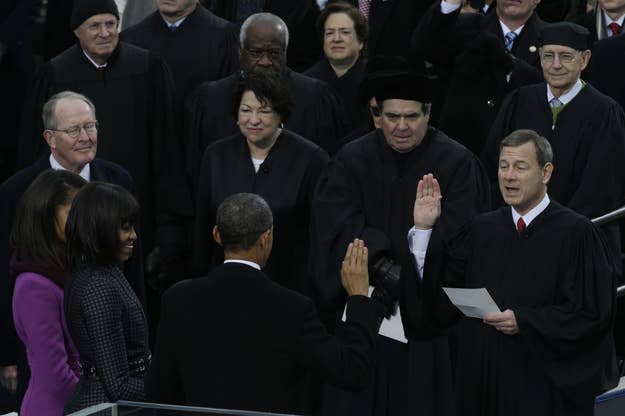
President Obama and some Congressional leaders already have parted ways over whether same-sex couples should be included in a broad overhaul of the nation's immigration laws, with some legislators even warning that their inclusion would be a "poison pill" for conservatives.
But both sides will have to keep their eyes on the Supreme Court, which will hear arguments in March on whether the Defense of Marriage Act's federal prohibition on recognizing same-sex couples' marriages is constitutional. The question of whether the non-citizen same-sex spouse of an American can get a green card — currently prohibited by DOMA — could be, for the most part, answered before the end of June.
As Obama addressed immigration reform in Las Vegas Tuesday, Sen. John McCain — one of the four Republican backers of the Senate framework announced Monday — warned that including same-sex couples in the legislation — would be a "red flag."
If the Supreme Court strikes down Section 3 of DOMA, however, the Department of Homeland Security likely would begin recognizing marriages legally entered into by same-sex couples and would then grant green cards where appropriate.
The court ruling is far from certain, though, so LGBT advocates and their congressional supporters are likely to continue to push for the inclusion of same-sex couples in immigration reform legislation as the discussion progresses.
Those who have not expressed support for including same-sex couples in the reform, meanwhile, could be hoping that the Supreme Court saves them from a vote on what many see as a losing position. Sen. Marco Rubio, for instance, told BuzzFeed that lawmakers will need to consider "what it means for [other] federal law[s], how it overlaps with the debate on DOMA and other issues."
Even if the court were to strike down Section 3 of DOMA, though, it is not yet clear how the Department of Homeland Security, in processing green card applications, will handle same-sex couples living in states where same-sex couples cannot marry.
The legislative effort that has been included in past Democratic reform frameworks is the Uniting American Families Act, a bill that does not only apply to same-sex married couples but rather creates a new category, called a "permanent partner," that could include any same-sex couple in a long-term relationship. A fact sheet released by the White House Tuesday states the president's blueprint for reform "treats same-sex families as families by giving U.S. citizens and lawful permanent residents the ability to seek a visa on the basis of a permanent relationship with a same-sex partner."
Despite all the action this week, though, any move on the issue by Congress in the coming months will need to consider — and could be dramatically altered by — the Supreme Court's consideration.
